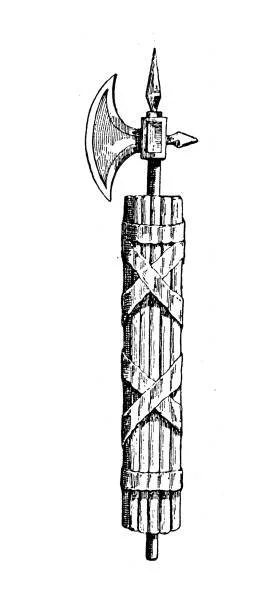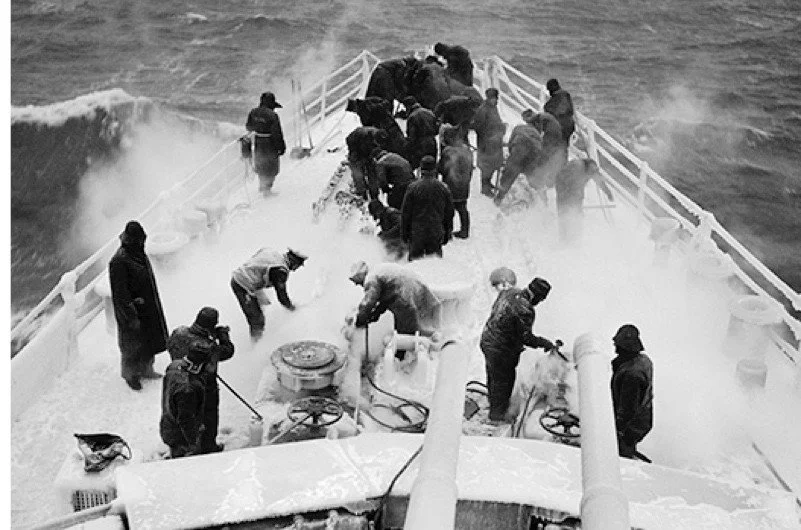Appendix G: What is Fascism
So this appendix is a little different from the others I have done. Usually they are either interviews with authors of works relevant to the show or just material that I think is pertinent but wasn’t able to fit into the narrative. This one is more of a clarification. In the last few months I have seen the term Fasism thrown around a lot, and not always accurately. This got me thinking that I never really defined what fascism is. I looked back through my first few episodes when I talked about the rise of fascism as a movement in the 1920’s and while I did describe it in many ways I never defined it. I never clearly articulated what fascism is, what are its traits, how do you know if a movement is fascist? In a podcast about a war that was essentially a conflict against fascism I think this is an important topic to cover. So lets correct that now in Appendix G: What is Fascism?.
I find that oftentimes historians over-define fascism. Frequently they will so narrowly define fascism so that it is only applicable to Mussolini and Hitlers movements in Italy and Germany in the 1920’s to 1930’s which I suppose is fine for a historical research paper but doesn’t help a political scientist or just someone trying to understand the world. So let's begin with what fascism is not. Fascism is not just another word for authoritarianism. That is the most common and egregious error I see. Fasicsm is certainly a flavour of authoritarianism but it would be wrong to describe any unpopular autocrat like, say, Saddam Hussein as a Fascist. Fascism is also not a set of tactics. Sometimes people like to describe anyone who they perceive as trying to silence them as fascists. It's not the use of violence as a political tool either. Those are both tactics that fascists frequently use but it's not what defines their political ideology.
So what does define Fascism as a political movement? Well, a number of things and some contradictory things, it's difficult to create hard and fast rules. This is partly because fascism is a somewhat amorphous, nebulous, often irrational ideology and it varies from nation to nation. Italian and German Fascism, the prototypical fascist movements, were not monolithic and did not have identical goals or beliefs. What they did have in common though were three traits that I believe are universal among fascist movements: First; they are authoritarian meaning the belief in consolidating power in the state and a strict obedience to that authority. Second, they are ethno-nationlist movements. That is to say they exist to promote the status of an in-group that is based on race or ethnicity. They are decidedly not civic nationalists, civic nationalism, sometimes called French nationalism, being the idea that all members of the republic that demonstrate republican virtue are members of the nation. Lastly, they are motivated by a personality-cult. All members of a fascist movement owe their allegiance to one man who is the embodiment of the movement. Mussolini in Italy and hitler inGermany. If the center of the personality cult disappears the unifying effect of the movement dissolves.
So what regimes or movements does this definition rule out? Well, let's start with some easy ones. The soviet union was not fascist. Yes it was a totalitarian, authoritarian regime but it was not organized around ethno-nationalism nor was it centered on a personality cult. Some might argue that Stalin created a cult of personality around himself but I would argue that while Stalin attempted to create a personality-cult it was never genuine. Fascism requires genuine infatuation with its leader. Many autocratic regimes try to inspire devotion to the despot but usually this devotion is only superficial and carried out by the population as a motion to avoid reprisals from state security. Communist china is not fascist. Again, it's authoritarian and arguably a Han nationalist state but it lacks the personality cult. I do not believe Xi Cinping commands the personal devotion of the party that Hitler or Mussolini did. On the other hand, I would argue North Korea fits the mold perfectly. The problem is that it is a communist regime and fascism nearly universally defines itself as being anti-communist. And unlike China, North Korea still seems to be operating under a basically a stalinist system. Its also very difficult to say how genuine the cult of personality in North Korea is. The cult of the state is so deeply ingrained into society that the two seem impossible to untangle. So I would say it is something very like fascism but not exactly, you could certainly make the argument though.
It's also important to remember that there are many fascist movements that fail to ever achieve total control of the state and some movements that closely resemble fascism but which are not. Take something like the KKK. That was a white-nationlist organization that at some points, particularly the 1920’s, had charismatic leaders. What the KKK sought however was not full on autocracy but rather illiberal democracy. Something similar to a citizen stratocracy or something, where the privileged in-group gets all the benefits of society and the out-groups do not. They would likely have maintained a functioning democratic system, albeit an illiberal one, though. Essentially that is what they did throughout the south for decades. Klan members made it to the highest halls of power in the American South and created their illiberal democracy through Jim Crow. Perhaps Huey Long could have turned them full fascist but that never happened.
So we have three aspects of fascism but there are many more behaviors that are associated with it. Plaseterd outside the holocaust Museum in Washington D.C. is a plaque that lists 14 early signs of Fascism. These include: powerful and continuing nationalism, disdain for human rights, identification of enemies as a unifying cause, supremacy of the military, rampant sexism, controlled mass media, obsession with national security, religious and government entanglement, corporate power protected, labor power suppressed, disdain for intellectuals and the arts, obsession with crime and punishment, rampant cronyism and corruption, and fraudulent elections. Even within that list some of those may appear hypocritical. How can they be obsessed with crime and punishment yet operate with rampant corruption? Well, it's because of the irrationality that is baked into the ideology. The obsession with crime and punishment is a way to create a privileged class for members of the movement or in-group. The corruption and cronyism is a way of rewarding members and elevating them above the out-group. The protection of corporate power ties right into this. The corporate powers that support the movement are rewarded through a crony-capitalist system.
The Encyclopedia britannica has an incredibly well written article on the common characteristics of fascism that also apply, I will cover those that are not already covered. These include diametric opposition to marxism. As I already mentioned Fascism nearly defines itself by what it is not, and that is communism. Now, you may remember back to episode 1 when I described both mussolini and hitler’s parties originating in the socilaist political movements of the interwar period and think how can they be anti-comminust when they grew out of socialism? Well, in the late teens and early 1920’s modern right and left had already been defined in terms of political orientation. The right was occupied by small “c” conservatives, even monarchists at that time, and the left by liberals, and small ‘r’ republicans. Economic orientation had not yet really been defined into our modern concept of right and left in which market capitalism is on the right and state intervention is on the left. I’m speaking broadly here, there are many modern politicians on the right who embrace government intervention in the market while simultaneously boo-hooing socialism. Both the italian and german fascist governments undertook massive interventions in their economies during the 30’s and 40’s but were absolutely opposed to full socialism or communism despite large takeovers of industry by the state and lots of central planning. They could not eliminate private enterprise however, it was also private citizens and corporations that directly managed workers and resources rather than some party apparatchik.
The encyclopedia Britannica also lists opposition to democracy as a key tenant. You might then think that any group that participates in democracy as inherently not fascist but that would be an incorrect conclusion. Fascist parties rarely seize power through violent revolution or coups but rather through electoral politics. They are happy to use the avenues of democratic institutions to seize the government but they will quickly move to protect themselves from ever losing power. They may abolish democratic institutions entirely but more likely they will retain the forms of democracy but so cripple it as to guarantee themselves power through rigged elections. There are any number of tactics to do this but illiberal democracy is the most likely outcome.
Next is listed the opposition to political liberalism. But what do we mean by political liberalism? I don’t mean american political liberalism when I say that, I mean the more universal context of the word in which liberalism is the belief in personal and political freedoms, the value of individual human life and the rule of law. Liberalism is essentially a rejection of the ancien regime in which an arbitrary aristocracy rules through irrational laws and enjoys unearned privileges. Fascism often describes liberalism as corrupting the national spirit or infringing on some imagined past or old way of doing things. This leads fascism to nearly always being reactionary. There is always some cultural issue that must be combatted, some perceived change that must be stopped.
One key aspect of Fascism not already covered is its need to engage in scapegoating. German Fascism is inseparable from its anti semitism. Every problem could be traced back to the jewish race and it became a guiding principle. For most fascist groups immigrants fill the role of some outgroup that must be scapegoated, though liberals, gypsies, homosexuals, or essentially any minority group can be utilized by the fascist movement. The key is just some outgroup that can be easily othered.
There are many other possible characteristics of fascism and I’ve listed quite a few already but remember those are characteristics not universal aspects. Every fascist movement is unique and takes up different causes and points to different groups as scapegoats unique to its own cultural and national origin. It is the three key aspects of ethno-nationalism, authoritarianism, and cult of personality that define fascist movements. Even if they never achieve their authoritarian ends its the pursuit of those ends that is defining. And remember, the authoritarian tendencies are expressed outside of holding power in their deep reverence for the leader of the movement who is the final authority on all matters. A movement that embodies all three of these I believe could safely be labeled fascist and if it exhibits these three aspects then it might be wise to see if it possesses the other potential characteristics mentioned.
You’ll notice I didn’t mention any specific movements or regimes since the Fasicst and Nazis parties of italy and germany. I certainly think there have been many fascist movements since the end of the second world war but it’s often dangerous to call them out. I also don’t want to involve modern politics in the show. The focus remains on history and the second world war specifically. But all students of history must study history through the lens of their own time. Yes, I believe history is interesting and worth studying in its own right but if you are not trying to draw lessons from the past then what is the point? The past is the great laboratory of mankind. Nothing is new under the sun and for all current events there is some historical analogue for it. The topic of Fascism is not only integral in discussing the second world war but also relevant to global politics today. Therefor I believe it is important to define not only in terms of this show but for its relevance in the modern world.



